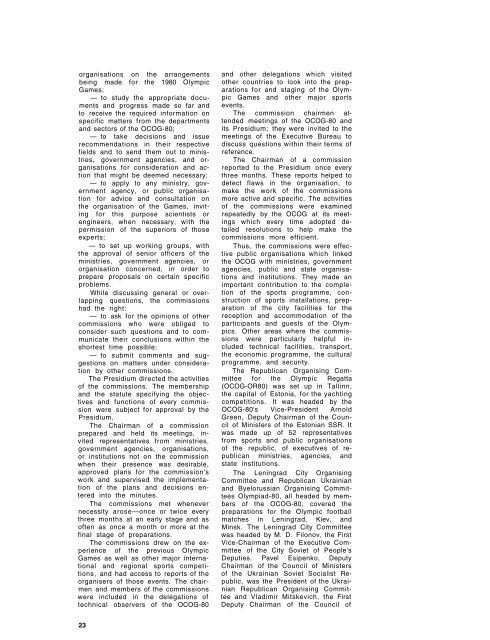or1980v2pt1
or1980v2pt1
or1980v2pt1
You also want an ePaper? Increase the reach of your titles
YUMPU automatically turns print PDFs into web optimized ePapers that Google loves.
organisations on the arrangements<br />
being made for the 1980 Olympic<br />
Games;<br />
— to study the appropriate documents<br />
and progress made so far and<br />
to receive the required information on<br />
specific matters from the departments<br />
and sectors of the OCOG-80;<br />
— to take decisions and issue<br />
recommendations in their respective<br />
fields and to send them out to ministries,<br />
government agencies, and organisations<br />
for consideration and action<br />
that might be deemed necessary;<br />
— to apply to any ministry, government<br />
agency, or public organisation<br />
for advice and consultation on<br />
the organisation of the Games, inviting<br />
for this purpose scientists or<br />
engineers, when necessary, with the<br />
permission of the superiors of those<br />
experts;<br />
— to set up working groups, with<br />
the approval of senior officers of the<br />
ministries, government agencies, or<br />
organisation concerned, in order to<br />
prepare proposals on certain specific<br />
problems.<br />
While discussing general or overlapping<br />
questions, the commissions<br />
had the right:<br />
— to ask for the opinions of other<br />
commissions who were obliged to<br />
consider such questions and to communicate<br />
their conclusions within the<br />
shortest time possible;<br />
— to submit comments and suggestions<br />
on matters under consideration<br />
by other commissions.<br />
The Presidium directed the activities<br />
of the commissions. The membership<br />
and the statute specifying the objectives<br />
and functions of every commission<br />
were subject for approval by the<br />
Presidium.<br />
The Chairman of a commission<br />
prepared and held its meetings, invited<br />
representatives from ministries,<br />
government agencies, organisations,<br />
or institutions not on the commission<br />
when their presence was desirable,<br />
approved plans for the commission's<br />
work and supervised the implementation<br />
of the plans and decisions entered<br />
into the minutes.<br />
The commissions met whenever<br />
necessity arose—once or twice every<br />
three months at an early stage and as<br />
often as once a month or more at the<br />
final stage of preparations.<br />
The commissions drew on the experience<br />
of the previous Olympic<br />
Games as well as other major international<br />
and regional sports competitions,<br />
and had access to reports of the<br />
organisers of those events. The chairmen<br />
and members of the commissions<br />
were included in the delegations of<br />
technical observers of the OCOG-80<br />
23<br />
and other delegations which visited<br />
other countries to look into the preparations<br />
for and staging of the Olympic<br />
Games and other major sports<br />
events.<br />
The commission chairmen attended<br />
meetings of the OCOG-80 and<br />
its Presidium; they were invited to the<br />
meetings of the Executive Bureau to<br />
discuss questions within their terms of<br />
reference.<br />
The Chairman of a commission<br />
reported to the Presidium once every<br />
three months. These reports helped to<br />
detect flaws in the organisation, to<br />
make the work of the commissions<br />
more active and specific. The activities<br />
of the commissions were examined<br />
repeatedly by the OCOG at its meetings<br />
which every time adopted detailed<br />
resolutions to help make the<br />
commissions more efficient.<br />
Thus, the commissions were effective<br />
public organisations which linked<br />
the OCOG with ministries, government<br />
agencies, public and state organisations<br />
and institutions. They made an<br />
important contribution to the completion<br />
of the sports programme, construction<br />
of sports installations, preparation<br />
of the city facilities for the<br />
reception and accommodation of the<br />
participants and guests of the Olympics.<br />
Other areas where the commissions<br />
were particularly helpful included<br />
technical facilities, transport,<br />
the economic programme, the cultural<br />
programme, and security.<br />
The Republican Organising Committee<br />
for the Olympic Regatta<br />
(OCOG-OR80) was set up in Tallinn,<br />
the capital of Estonia, for the yachting<br />
competitions. It was headed by the<br />
OCOG-80's Vice-President Arnold<br />
Green, Deputy Chairman of the Council<br />
of Ministers of the Estonian SSR. It<br />
was made up of 52 representatives<br />
from sports and public organisations<br />
of the republic, of executives of republican<br />
ministries, agencies, and<br />
state institutions.<br />
The Leningrad City Organising<br />
Committee and Republican Ukrainian<br />
and Byelorussian Organising Committees<br />
Olympiad-80, all headed by members<br />
of the OCOG-80, covered the<br />
preparations for the Olympic football<br />
matches in Leningrad, Kiev, and<br />
Minsk. The Leningrad City Committee<br />
was headed by M. D. Filonov, the First<br />
Vice-Chairman of the Executive Committee<br />
of the City Soviet of People's<br />
Deputies. Pavel Esipenko, Deputy<br />
Chairman of the Council of Ministers<br />
of the Ukrainian Soviet Socialist Republic,<br />
was the President of the Ukrainian<br />
Republican Organising Committee<br />
and Vladimir Mitskevich, the First<br />
Deputy Chairman of the Council of


